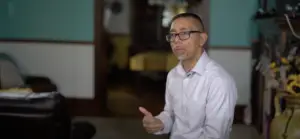“When the Son of man comes in His glory, and all the angels with Him, then He will sit on His glorious throne. Before Him will be gathered all the nations, and He will separate them one from another as a shepherd separates the sheep from the goats, and He will place the sheep at His right hand, but the goats at the left. Then the King will say to those at his right hand, ‘Come, O blessed of my Father, inherit the kingdom prepared for you from the foundation of the world…for I was a stranger and you welcomed Me… Truly, I say to you, as you did it to one of the least of these my brethren, you did it to Me.’” (Matthew 25:31-40)
We’ve all been there. Someone new has come through the doors of your church. Maybe you noticed them when they forgot to light a candle on their way inside the sanctuary, or maybe you noticed them when they stood where your family always stands, week after week.
In the beautiful rituals of the Divine Liturgy, it’s easy to get caught on snags like this, easy to focus on keeping the rhythm of the services. It’s harder to imagine or remember being a new person in your parish. But what if you were the stranger at your church? And what if you were coming after your release from prison?
On Judgment Sunday, the week before the beginning of Great Lent, when every Orthodox parish around the world hears the famous passage in the Gospel of St. Matthew of Christ’s coming judgment, we often focus on Christ identifying Himself with those in prison. When we visit those in prison, we visit Christ—God said so Himself. But of all the people Christ identifies Himself with in this passage, perhaps the easiest to overlook is “the stranger.” His easiest commandment to forget is simply welcoming those in need of welcome.
Eddie Bocanegra served fourteen years in prison and was fortunate enough to be welcomed into the Orthodox Christian community after his release. Now Eddie is a national violence prevention advisor and is calling on every Orthodox Christian to recognize their calling to welcome the stranger.
“As Orthodox Christians, we take a step forward and push our comfort zone to meet people where they’re at,” he says, knowing those in prison are among the most marginalized people in the world. “We have to challenge ourselves and our perceptions to truly find Christ in every person that we come across.” Those in prison or released from prison may not be like people we know, people already in our parish, people next door to us, but “when we think about when Christ was walking on this earth, where we’re required to go, He was walking with those that needed healing, those that needed hope. There are so many stories across Scripture that that highlight that. And so as Christians, and especially as Orthodox Christians, we are called to work with those in the margins.”
OCPM is proud to maintain relationships with the people we serve in prison over years or even decades at a time, and with many people this means continuing to meet a person’s needs long after his or her release. Indeed, prison ministry does not only happen inside the walls of a prison.
This Lenten season, we are challenging our community (and ourselves!) to reflect on Eddie’s call to action. What are some ways you could welcome the stranger in your parish this season? Could you find them at coffee hour? Could you find them coming through the door? We truly never know what someone has been through—or all the good possible from simply welcoming the stranger.

